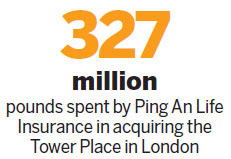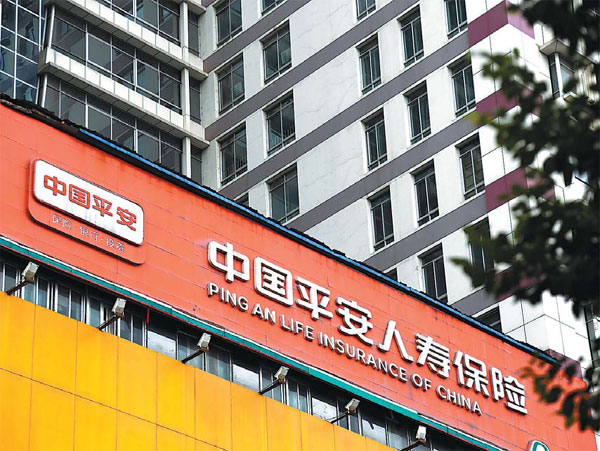Chinese buyers like London for housing cash
Updated: 2015-01-30 08:42
By Cheng Yingqi(China Daily Europe)
|
|||||||||||
While investment interest rises, so is concern about softening prices
The recent acquisition of London's landmark office building Tower Place marks unprecedented growth in the appetite of Chinese companies for European real estate.
But this also comes at a time of mounting concern over a softening in the prices of British real estate.
|
Ping An Life Insurance (Group) recently bought the Tower Place in London from Deutsche Asset & Wealth Management. Photos provided to China Daily |
China's second-largest insurance company, Ping An Life Insurance (Group) Co, has just acquired the Tower Place in London for 327 million pounds ($490 million; 439 million euros) from Deutsche Asset & Wealth Management.
Ping An in July 2013 bought the Lloyds of London building, home to the world's oldest insurance market, for 260 million pounds. And another major insurer, China Life, purchased a tower in London's Canary Wharf for 795 million pounds in June 2014.
The rush to the European real estate market followed China relaxing restrictions on insurance companies' overseas investments. A regulation published in July 2013 allowed Chinese insurers to lay out 15 percent of their total assets for investments inside or outside China.
"Insurers have turned their attention to Europe, to the US and elsewhere. And we shall expect more capital flowing out of China," says Zhao Liping, deputy director of Beijing Insurance Research Institute, a leading think tank in China's insurance sector.
"Both the insurers and the China Insurance Regulatory Commission will make a priority of capital safety," he says.
Tower Place, the low-rise office and shopping complex designed by Norman Foster in the heart of London's insurance district near the Tower of London, and is occupied by the US insurance consultancy Marsh & McLennan Companies Inc.
The half-billion dollar purchase, however, represents just the tip of the iceberg of Chinese investors' enthusiasm for overseas property.
In 2014, Chinese outbound capital surged to over $16.5 billion, a 46 percent increase from the previous year, according to a report issued by global real estate services firm Jones Lang LaSalle on Jan 26.
"For the first time ever, Chinese companies have spent more on commercial real estate outside China than domestically, a significant milestone and a sign that the domestic market is entering a new phase," says Darren Xia, head of the international capital group of Jones Lang LaSalle China.
Xia attributed the growing appetite for overseas property to the government's macro controls and the dampened domestic market.
"International markets allow Chinese investors to continue to grow sustainably and ensure long-term returns. Notably, activity once again focused on the major cities of the world, which Chinese investors now know well, such as London, Sydney and the major US metropolitans," Xia said.

London, among the most popular cities for investors, tends to be the favorite of Chinese companies. Last year, Chinese investors poured $4 billion in cash into London, contributing nearly 10 percent of the global investment in the city's commercial real estate, or about a quarter of the total amount Chinese spent abroad.
The large-scale investment drove up UK real estate prices starting in July 2013. Last year, house prices rose 8.3 percent, as shown by the Hometrack UK Cities House Price Index.
In the case of Ping An's latest acquisition, the target building was valued at 369 million euros ($416 million) by Deutsche Bank in September, equivalent to 84 percent of the transaction price several months later, according to a Bloomberg report.
"Due to the limited information disclosure, it is still hard to judge whether the price surge was caused by competitive bidding, currency changes or an increase of the property price, but price inflation is likely to be a cause," according to an expert specializing in mergers and acquisitions, who declined to be named because of his company's regulations.
However, the rapid price surge momentum seemingly ended in August, thanks to deflation measures taken by the UK's central bank to curb fast housing price increases.
The House Price Index 2014 published by Nationwide, one of the UK's largest mortgage providers, shows that the growth in housing prices moderated in the fourth quarter of 2014, with 12 of the 13 UK regions seeing the pace of annual price increases slow.
The Center for Economics and Business Research also forecast that housing prices would reach a turning point this year.
Paul Hodges, chairman of the IeC advisory firm and an expert in the economic impact of demographics, predicted housing prices in UK would fall by 50 percent in an interview with the UK financial magazine Money Week on Jan 22.
"We've seen price falls in the housing market in the past, in the early '90s, and they went down 50 percent, and I think that we're at the start of that kind of decline now," Hodges said, seeing it as a result of efforts to deflate economic bubbles created by stimulus plans used to cope with the financial crisis.
Dropping along with expectations for housing prices is the cap rate for commercial properties. According to Jones Lang LaSalle's statistics, the global average rent yields for high-quality office buildings had fallen from 6.62 percent in 2010 to 5.38 percent in the fourth quarter 2014.
"Although 5.38 percent is not a very attractive return on assets, commercial assets are still a good option for global asset allocation of Chinese companies," says Julien Zhang, managing director of JLL North China.
"Amid the tide of globalization, the large corporations in China have to think seriously about their global asset allocation. And quality commercial real properties, with lower risks and lower rewards, have their role to play in a company's strategic layout, especially for insurance companies that are trying to keep their money safe."
So, is it, after all, a good time to enter the overcrowded UK real estate market, especially for insurers?
"It depends on whether you are investing for the long-term strategy or a short-term speculation," says Xia of Jones Lang LaSalle China.
"The property in prime locations always has substantial room for gains when the market has recovered," he says.
He also suggests that buyers select office buildings that do not have long-term leases so that the rent can fluctuate along with market changes and bring more benefits to owners.
Contact the writer at chengyingqi@chinadaily.com.cn
chengyingqi@chinadaily.com.cn
( China Daily European Weekly 01/30/2015 page22)
Today's Top News
China: Norway violates rights of Chinese scholar
Italy extradites suspect in theft
A great future for UK-China business relationship
President Xi meets Russian Foreign Minister
Former IMF chief Strauss-Kahn on trial over pimping charges
Business leaders push for deeper China-EU economic ties
US taking 'fresh look' at weapons for Ukraine
New regional system set up
Hot Topics
Lunar probe , China growth forecasts, Emission rules get tougher, China seen through 'colored lens', International board,
Editor's Picks

|

|

|

|

|

|






